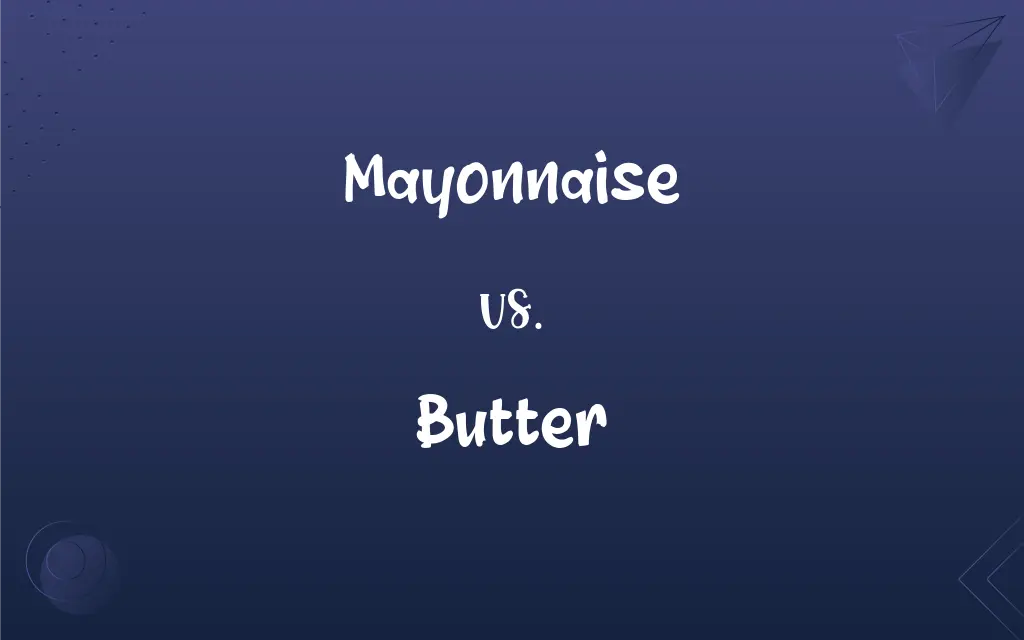Mayonnaise vs. Butter: What's the Difference?
Edited by Harlon Moss || By Janet White || Published on December 1, 2023
Mayonnaise is a creamy condiment made from oil, egg yolk, and vinegar or lemon juice, while butter is a dairy product made from churning cream.

Key Differences
Mayonnaise is an emulsion primarily made of oil, egg yolks, and an acid like vinegar or lemon juice. Butter, in contrast, is a dairy product made by churning cream, separating the butterfat from the buttermilk.
Mayonnaise has a creamy, thick consistency and is smooth, used often as a spread or in dressings. However, butter, with a rich and creamy texture, solidifies at cool temperatures and melts at warm temperatures, used in cooking and as a spread.
Mayonnaise is widely used in sandwiches, salads, and as a base for sauces. While, butter is versatile in baking, cooking, and as a condiment for bread and vegetables.
Mayonnaise often has a tangy, slightly acidic taste and comes in various flavors, including garlic or herb-infused varieties. Butter has a rich, creamy taste and can be salted or unsalted, with cultured or clarified versions available.
Mayonnaise is high in calories and fat, mostly unsaturated fats from the oil. Butter is also high in fats, predominantly saturated fats, and contains cholesterol.
ADVERTISEMENT
Comparison Chart
Primary Ingredients
Oil, egg yolk, vinegar/lemon juice
Cream (butterfat)
Consistency
Creamy and thick
Solid at cool temperatures, melts when heated
Uses in Cooking
Sandwiches, salads, sauces
Baking, cooking, spreading
Flavor Profiles
Tangy, slightly acidic, various flavors
Rich, creamy, can be salted or unsalted
Nutritional Content
High in unsaturated fats
High in saturated fats, contains cholesterol
ADVERTISEMENT
Mayonnaise and Butter Definitions
Mayonnaise
Often used as a base for various salad dressings.
She made a garlic mayonnaise for the Caesar salad.
Butter
An essential ingredient in many baking recipes.
The recipe calls for unsalted butter.
Mayonnaise
Commonly used as a spread in sandwiches and burgers.
A layer of mayonnaise enhances the taste of a BLT.
Butter
Used as a cooking fat and for flavoring in dishes.
She used butter to sauté the vegetables.
Mayonnaise
An emulsion of oil, egg yolk, and a form of acid.
The key to smooth mayonnaise is gradual oil addition.
Butter
Often used as a spread for bread, pancakes, and more.
He spread a thick layer of butter on his muffin.
Mayonnaise
A thick, creamy sauce made from oil, egg yolk, and acid.
Mayonnaise adds flavor to a turkey sandwich.
Butter
A solid dairy product made from churning cream.
Butter melted over warm toast is delicious.
Mayonnaise
An ingredient in many sauces and dips.
Homemade aioli is made with mayonnaise and garlic.
Butter
Adds a rich, creamy flavor to food.
A dab of butter enhanced the flavor of the grilled corn.
Mayonnaise
A thick dressing made of beaten raw egg yolk, oil, lemon juice or vinegar, and seasonings.
Butter
A soft yellowish or whitish emulsion of butterfat, water, air, and sometimes salt, churned from milk or cream and processed for use in cooking and as a food.
Mayonnaise
A dressing made from vegetable oil, raw egg yolks, vinegar or lemon juice, and seasoning, used on salads, with french fries, in sandwiches etc.
Mayonnaise
Any cold dish with that dressing as an ingredient.
We served a lobster mayonnaise as a starter.
Hair mayonnaise
Facial mayonnaise
Mayonnaise
(transitive) To cover or season with mayonnaise.
Mayonnaise
A thick white sauce compounded of raw yolks of eggs beaten up with olive oil to the consistency near to that of a gel, and seasoned with vinegar, pepper, salt, etc.; - used in dressing salads, fish, etc. Also, a dish dressed with this sauce.
Mayonnaise
Egg yolks and oil and vinegar
FAQs
What is mayonnaise?
Mayonnaise is a thick, creamy dressing or spread made primarily from oil, egg yolk, and vinegar or lemon juice.
Can mayonnaise be made without eggs?
Yes, there are egg-free versions using aquafaba or soy milk as alternatives.
Is mayonnaise dairy-free?
Traditional mayonnaise is dairy-free as it doesn't contain milk products.
Is mayonnaise gluten-free?
Generally, yes, but it's important to check the label for additives that might contain gluten.
How long does mayonnaise last?
Unopened, it can last up to a year. Once opened, it should be used within two months.
Can mayonnaise be used in cooking?
Yes, it's often used in baking, grilling, and as a base for sauces.
Are there vegan alternatives to mayonnaise?
Yes, vegan mayonnaise substitutes egg with plant-based ingredients.
What is butter?
Butter is a dairy product made from churning cream or milk to separate the solid fats and liquid.
Is butter considered dairy?
Yes, since it's made from milk or cream.
How is mayonnaise made?
It's made by slowly adding oil to egg yolks while whisking vigorously to create an emulsion.
How long does butter last?
Refrigerated, it can last up to a month. Freezing can extend its life up to a year.
Is butter gluten-free?
Pure butter is gluten-free, but it's important to check for additives in flavored or processed varieties.
Is butter healthy?
Butter is high in saturated fats, so it's best consumed in moderation.
Can mayonnaise be frozen?
Freezing is not recommended as it can break the emulsion and alter the texture.
Is mayonnaise healthy?
It's high in calories and fat, so it should be consumed in moderation.
Can butter be vegan?
Traditional butter is not vegan, but there are vegan alternatives made from plant-based oils.
Can butter be made from non-cow milk?
Yes, it can be made from the milk of other mammals like goats or sheep.
Can butter be used in baking?
Yes, it's commonly used in baking for its flavor and the texture it provides.
What is the difference between salted and unsalted butter?
Salted butter contains added salt, while unsalted butter does not.
What is clarified butter?
Clarified butter, or ghee, is butter that has been simmered to remove water and milk solids, leaving behind only the fat.
About Author
Written by
Janet WhiteJanet White has been an esteemed writer and blogger for Difference Wiki. Holding a Master's degree in Science and Medical Journalism from the prestigious Boston University, she has consistently demonstrated her expertise and passion for her field. When she's not immersed in her work, Janet relishes her time exercising, delving into a good book, and cherishing moments with friends and family.
Edited by
Harlon MossHarlon is a seasoned quality moderator and accomplished content writer for Difference Wiki. An alumnus of the prestigious University of California, he earned his degree in Computer Science. Leveraging his academic background, Harlon brings a meticulous and informed perspective to his work, ensuring content accuracy and excellence.






































































